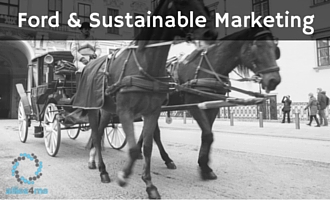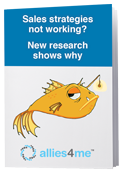
Be the Henry Ford of your industry. Market sustainable.
You have a wonderful product that makes the world a better place. You want everyone to buy it. If everyone did, it would create a better world, society and culture. But do you have a sustainable marketing plan? Are you enriching customers’ lives first, and improving the world as a side benefit? You may be convinced you are, but this is the moment for the hard, honest truth. If making your customer’s situation better isn’t your product’s primary benefit, then your company is at risk. As we discussed in our recent blog about Preparing for Recession, financial solvency is key. When the financial storms hit your customers, will the promise of sustainability be enough for them to spend scarce resources on your product?
Here’s $1 million of market research, at no charge, thanks to the lesson Toyota learned with the iconic Prius. The Prius was the badge of social responsibility for over a decade. But it suffered an 11% drop in sales in 2015[1]. With record-low gas prices, Toyota spent millions on Super Bowl ads pitching the Prius as an exciting car and tapping into the driver’s sense of adventure. They created a series of commercials showing four ordinary guys robbing a bank and outrunning the entire police force in a Toyota Prius. Eventually, the only way the police caught the four renegades was in a police edition Prius.
The ad made no allusion to carbon footprint or social responsibility. It didn’t need to. Customers intuitively know that saving gas is good for the environment. Toyota spent the money on the research. You can benefit from their research, or you can learn the lesson on your own.
 New research shows that buyers and sellers are misaligned. Get the latest survey results from over 500 global companies.
New research shows that buyers and sellers are misaligned. Get the latest survey results from over 500 global companies.
You have a responsibility
Toyota is pitching the Prius as the fun and exciting car. Elon Musk made the Tesla the most innovative and exciting car on the road (that also happened to be electric). Benefiting the customer is a high priority for both manufacturers. Is your message focused on shorter term benefit or sustainability? Do you know something Elon Musk & Toyota are missing? Social benefit never wins out at the expense of the customer’s core needs. In fact, if you believe in your cause, you have a responsibility to make it so compelling that it is the right choice for all of society.
Henry Ford did more than make cars affordable and desirable. He addressed one of the major environmental issues of the day. Yes, you read that correctly: the automobile solved a major environmental issue. In the late 1800’s, urban populations had grown to the point that city streets were becoming overwhelmed with horse manure. New York had 100,000 horses producing 2.5 million pounds of manure each and every day.[2] Ford’s automobiles solved an environmental problem by enriching the lives of everyone at an affordable price. Can you be the Henry Ford of your industry? Can you be unwaveringly committed to making your product or service both accessible and desirable to everyone?
“Green” and “sustainable” titles can work against you
If you’re not sure you want the “green” label associated with your brand, consider this: customers have an instant neural connection between the word “green” and the word “expensive.” Sure, there are some who don’t mind paying more for “green,” but do you really want to limit sales? When you say “green,” customers hear “expensive” and it will be almost impossible to dislodge that “expensive” association from their brains.
Look at Toyota. Prius sales dropped 11% and now they avoid the “green” angle like the plague. There is something to be learned from the pioneer of the original “green” automobile. Elon Musk is an amazing business leader, but his Tesla Motors site isn’t about sustainability. It is about excitement. Offer benefit and value. The customers who care about sustainability will connect the dots. More importantly, when the economy turns recessionary, customers will view you as the one who will save them money, not cost them money. Help them to see that they can’t afford NOT to buy your product.
Environmental sustainability begins with sustainable marketing
Do you want to make the world a better place? Start by making your sustainability product affordable and desirable to the masses. Don’t focus on the “green” qualities because your socially responsible customers will figure that out immediately. Sell them on the other benefits and value of your product and you’ll change the world in the process. Make your marketing sustainable and you’ll achieve the sustainability you desire for your company and the world.
 New research shows that buyers and sellers are misaligned. Get the latest survey results from over 500 global companies.
New research shows that buyers and sellers are misaligned. Get the latest survey results from over 500 global companies.
[1] http://adage.com/article/cmo-strategy/toyota-back-super-bowl-prius/302068/
[2] http://www.historic-uk.com/HistoryUK/HistoryofBritain/Great-Horse-Manure-Crisis-of-1894/